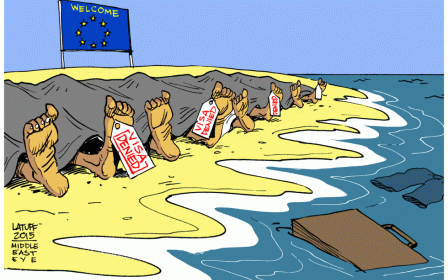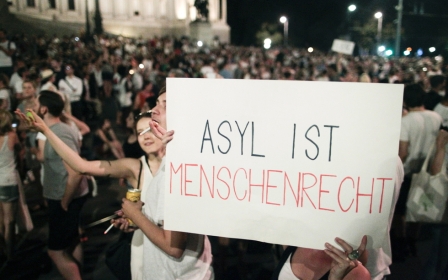Trains carrying Syrian refugees arrive in Austria, Germany

Thousands of people seeking refuge in the EU reached Austria and Germany by train on Monday, after Hungarian authorities allowed people stuck in makeshift refugee camps to leave Budapest despite many not having EU visas.
In Vienna alone, 3,650 people arrived in what was this year's biggest number of migrants, refugees and asylum seekers to arrive in one day, Austrian police said.
"We are still in the process of verifying how many of them are actually asylum-seekers," Austrian police spokesman Patrick Maierhofer told AFP.
"Thank God nobody asked for a passport ... No police, no problem," Khalil, a 33-year-old English teacher from Syria told Reuters at a train station in Vienna.
Many of those who travelled through Austria on Monday were headed for Germany which eased asylum restrictions for Syrian refugees last week.
On Tuesday morning, Budapest's main international railway station ordered an evacuation as 500 migrants and refugees tried to board a train to Vienna.
Europe is on the receiving end of the biggest movement of people since World War II, with more than 300,000 arriving this year, many fleeing war, persecution and poverty in the Middle East and Africa.
The escalating refugee crisis has divided the 28-member bloc ahead of fresh emergency talks on 14 September, with Western European leaders calling for more efforts to help the new arrivals while countries on its eastern borders say they are struggling to cope.
In a show of support for the migrants, 20,000 people took to the streets of Vienna on Monday evening to protest their ill-treatment, while senior government officials attended a church service for 71 refugees found dead in an abandoned truck last week.
Hungary's government criticised Berlin's easing of asylum rules - aimed at relieving pressure on southern European nations where migrants arrive by sea - as "(building) up the hopes of illegal immigrants".
Under current EU regulations, known as the Dublin provision, asylum-seekers must remain in the first European country they enter while their application is being processed.
Those who subsequently travel to other member states face deportation back to the EU country they originally entered.
Hungary has become a frontline country for migrants arriving via the western Balkans route as they flee war and unrest in the Middle East, Africa and Asia.
The Hungarian government on Monday demanded that Berlin clarify "the legal situation, in order to eliminate this ambiguity and controversy".
"It is in our common interest that all member states abide by EU legislation. Order and legality must be restored at the borders of the European Union," said government spokesman Zoltan Kovacs.
New MEE newsletter: Jerusalem Dispatch
Sign up to get the latest insights and analysis on Israel-Palestine, alongside Turkey Unpacked and other MEE newsletters
Middle East Eye delivers independent and unrivalled coverage and analysis of the Middle East, North Africa and beyond. To learn more about republishing this content and the associated fees, please fill out this form. More about MEE can be found here.




